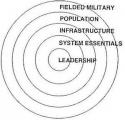
Originally Posted by
jmm99

Dr Holt's suggestion:
would be fine - if it were a 99% Astani effort and grew out of the villages themselves. The major problem in Astan is political, not military.
The Marine CAP program, and the majority of the CORDS programs, were good concepts - keeping in mind that CAP was a pilot program[*]. CORDS, as part of the larger South Vietnamese Pacification program (which included SVN CAP units as an integral part), has a greater number of "lessons learned".
If I were a political officer indigenous to a country plagued by an insurgency, I would adopt both as the central focus of my "COIN" effort - and find a military officer who agreed with me.
I suspect that events will gallop by before anything like Dr Holt's suggestions could be implemented. E.g, the SVN Pacification program (in various iterations) had a bit more than 15 years of historical development.
[*] We have to guard against the tendency to assume that, if a program works in 10 places (actually about 100 places in CAP's case), it will work in 10,000 places - must be at least that many villes and hamlets in Astan.
Regards
Mike














 . Now if he just gets our Missiles back for the Air Force everything will be OK.
. Now if he just gets our Missiles back for the Air Force everything will be OK.



Bookmarks